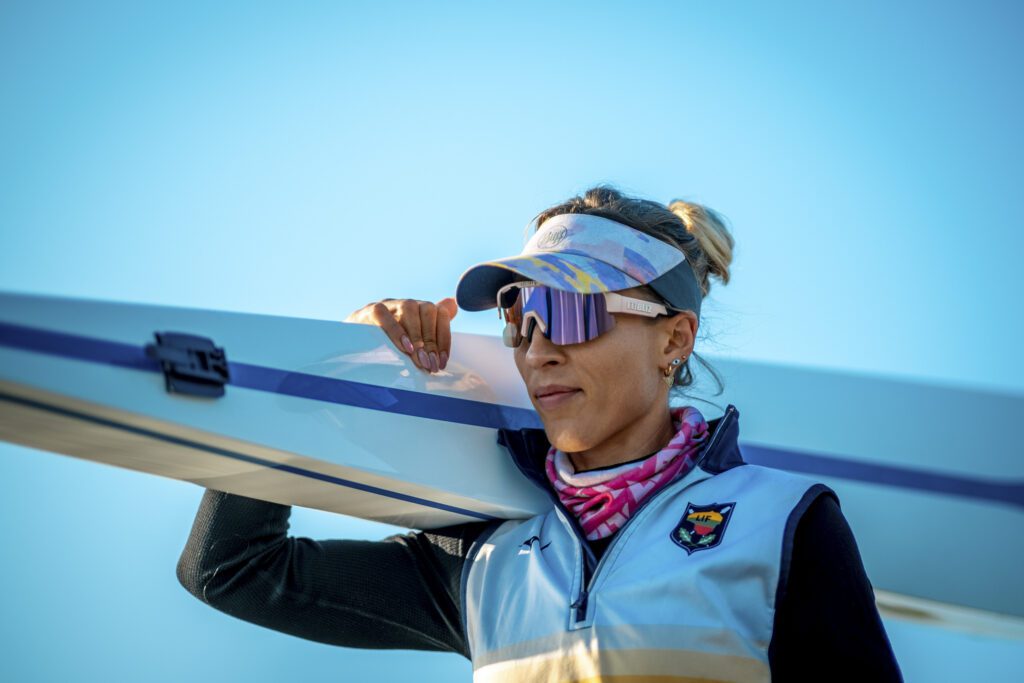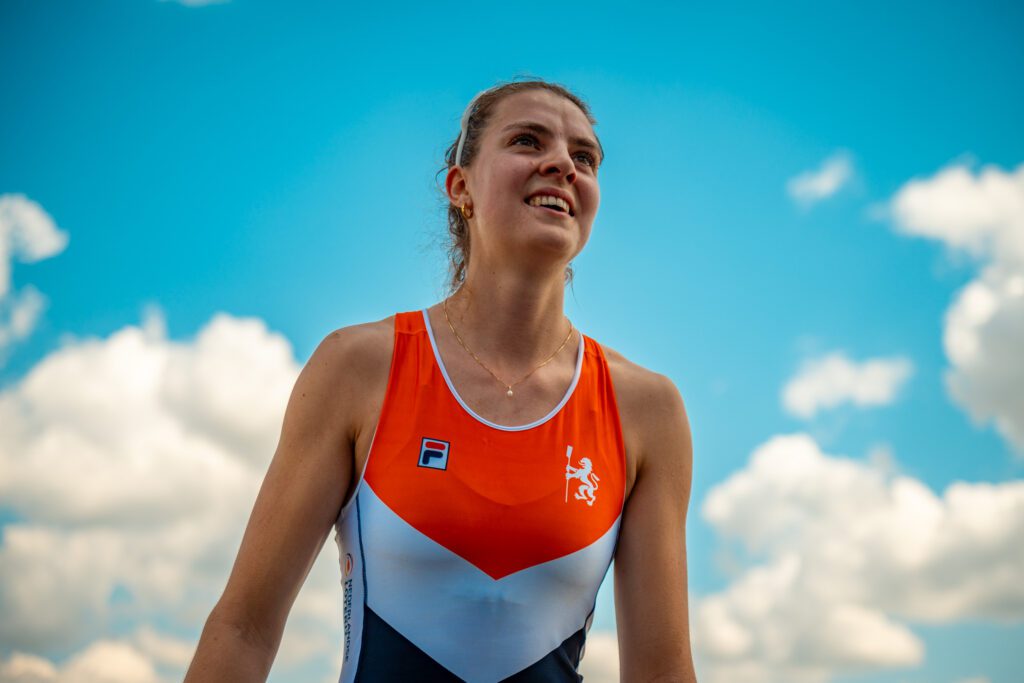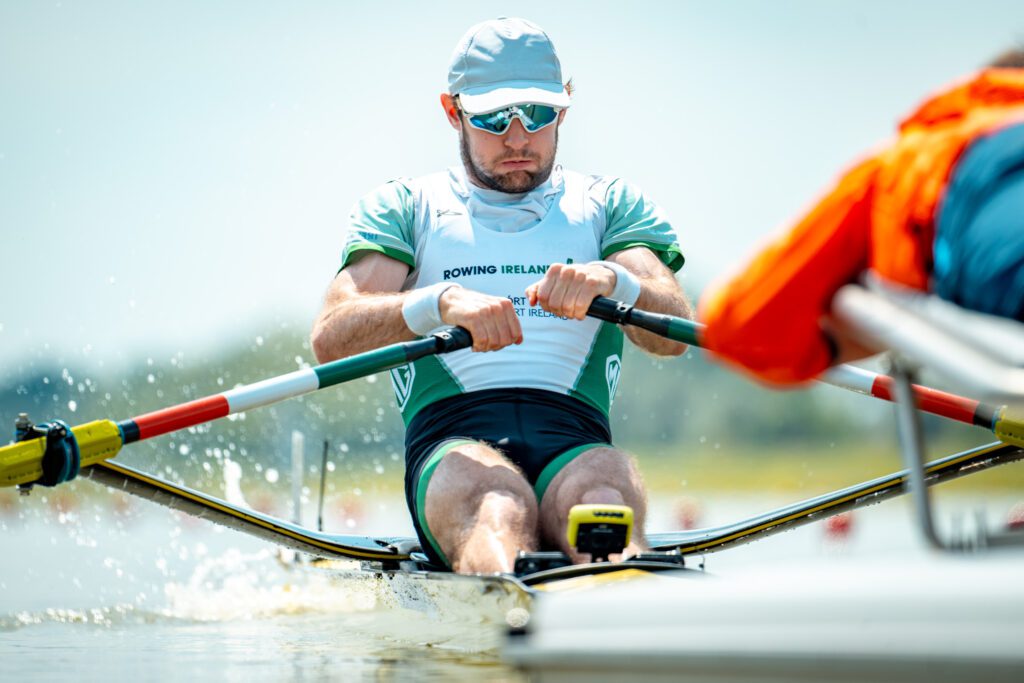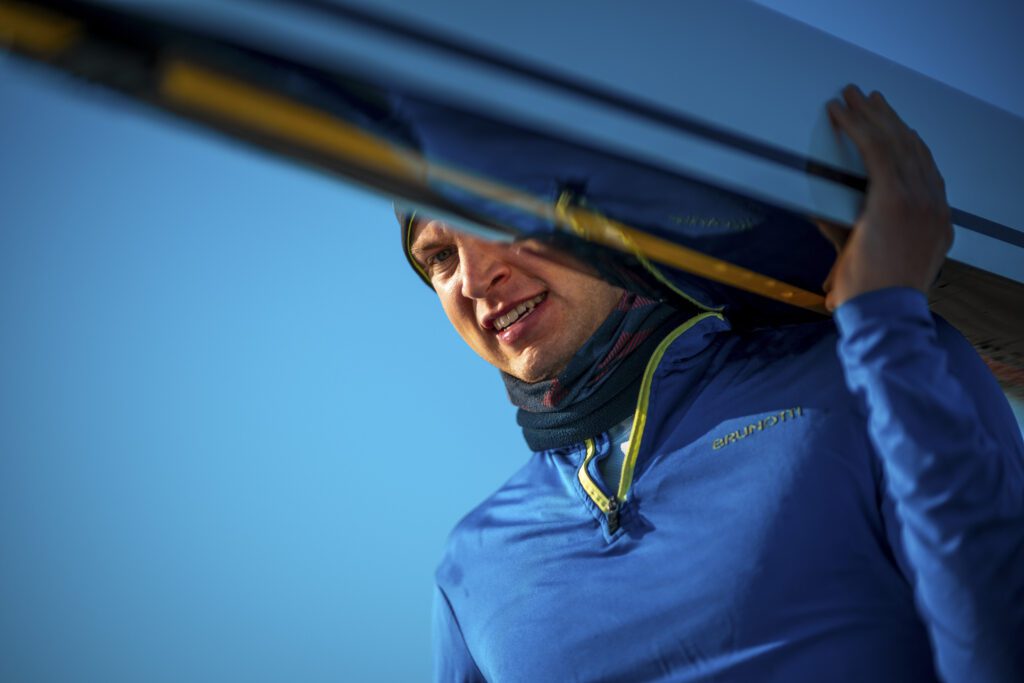Scorching conditions on the Rotsee were matched with scorching racing as the final points, medals and trophies of the 2023 World Cup series were awarded in Lucerne this weekend. Sunday started with a lake as glassily smooth as a clean sheet of paper and finished with blades ripping up the calm water and causing havoc for one another. There were surprises, squeakingly tight finishes and a lot of bravado on show plus three bronze medals for Switzerland out of the hosts’ three Olympic-class finals, roared on by the local crowd who support this event year in year out.
Row360 coverage of 2023 World Rowing Cup Series
There were sudden shocks for crews as eminent as the Croatian M2x and Irish LM2x, along with an upset or two in the eights. Oddly enough not many rowers were picked up by the medics at the finish line, even though the air temperature ratcheted to 34-36 degrees as the racing went on. But the women’s singles final looked gruelling, Karolien Florijn (NED) laboriously sculling over the line ahead of an equally treacle-like Tara Rigney (AUS) and Emma Twigg (NZL), the latter in her first international regatta this season. They were rating high but looked absolutely exhausted by the heat even before the line.
Rigney was star struck racing (and beating) Twigg who is one of her heroines, but the latter was pleased with a low-preparation bronze behind this Olympiad’s Dutch star. “I’m pretty happy where I was, we haven’t really had a build and haven’t done much speed work, so this one’s always a marker,” said the experienced Kiwi Olympic champion. Behind the top three Anna Prakaten (UZB) and Alexandra Foester (GER) faded rather early in the race, with Desislava Angelova from Bulgaria coming fourth as she had done in Zagreb and Bled, sweeping up another four points.
The LM2x final was one of the very best races of the regatta. Undaunted by the fearsome reputation of Irish world champions Paul O’Donovan and Fintan McCarthy, Ferdinand Ludwig and Hugo Beurey took the fight to them and sculled out of their skins, back to form after injuries earlier in the summer. They lost the advantage to Ireland and Switzerland in the third quarter, but for once that wasn’t the end of the story, with the Frenchmen rallying and putting in a 1:31 final 500m to grab the gold back again by 0.09 seconds. Not quite, officially, a photofinish, but there was a massive intake of breath while everyone waited for the result.
Amongst those who fulfilled largely predictable victories were German Olli Zeidler in the men’s single, Ancuta Bodnar and Simona Radis in the women’s double, and the Australian women’s pair of Jess Morrison and Annabelle Mcintyre, all by clear water. British lightweight women’s double Emily Craig and Imogen Grant also had an aura of invincibility but still go at every race as if it’s their last, so were out of breath five minutes after landing on the medal raft. Despite that Grant screeched her delight at having vanquished their Romanian, Greek and French rivals again, straight down the microphone of startled interviewer Tim Dellor who was recording her comments for posterity and BBC Radio Berkshire.
Zeidler was the only person this year to win all three world cups for a perfect score of 24 points, largely because he was one of the only top competitors to go to all three. Hard on his heels on the Rotsee though was Thomas Mackintosh of New Zealand, who got encouragingly close to both Zeidler and Denmark’s Sverri Nielsen in his first attempt at an international regatta in the single. Despite being effectively a newcomer in the M1x the Kiwi is a seasoned performer, having sweep medals from the juniors, U23s and seniors, most notably being first over the line in the men’s eights at the Tokyo Olympics.
“The eight’s great because it’s just a big bad ugly beast and you’ve got to throw all your weight at it,” said Mackintosh, after claiming bronze. “But the men’s single is different — you do need a lot of horsepower but it’s a delicate machine.” This time Zeidler and Nielsen beat the Kiwi but they should watch out because he’s picking up ‘tips and tricks’ from mentor Mahe Drysdale and looks set to be a real contender come the world champs.
Having had a big-margin ticket in the first Olympic-class final, things turned rapidly interesting in the men’s pairs, where Romania, Switzerland and Britain resumed their season’s conflict. Romania and GBR were never more than fractions of seconds apart, with Switzerland hot on their heels. With a change of tactic the Brits took just enough of a lead after midway without spending extra energy, lost it to a Romanian push in the final quarter but then nipped back through mere strokes before the line to claim an important psychological and gold medal win. Swiss pair Roman Röösli and Andrin Gulich had to settle for bronze but enchanted the local crowd by carrying off the world cup trophy for the event.
Britain’s women had one of their best days for a long time, adding eights gold and quads silver to their lightweight doubles result. The eight was a turn-around after their trouncing by Canada at Henley Royal Regatta: a week later in Lucerne the two were battling it out within feet of one another and of leaders Australia, before charging together through the Aussies as the buoys turned red and triumphantly claiming the top two medals.
“We have made a few mistakes along the way and we’ve really learned from them,” said Karen Bennett (GBR). “We have a bit of a rivalry going on with the British,” said Canadian cox Kristen Kit. “They’re two for one so they’ve gotten us twice and we’ve gotten them once. They’re such a classy crew, they’re such nice people but also such ferocious competitors”. As the women’s eights continues to be one of the most interesting events, watch this space for more developments.
The women’s quads was sculling combativity at its best, the Dutch winners calmly putting in one of their sterling gold performances, while behind them all sorts of mayhem was breaking out. At first it looked as if China would either steam through them or mop up silver in their wake, but a fantastic last 500 from both Britain and Switzerland cut mercilessly through the Chinese, who floundered in fourth as the others took silver and bronze respectively behind the Dutch.
Row360 coverage of 2023 World Rowing Cup Series
Absent the Poles, the Dutch predictably won the men’s quads without being unnecessarily hounded by anyone else, and the British men put together their finest row of the summer to take silver while Romania got the better of Australia by 0.11 seconds for the bronze. “It’s a new crew, we made a switch after the Europeans, so I’m very glad of the result,” said Dutch former lightweight and now M4x bowman Leonard van Lierop.
The men’s doubles woke up the race- and lunch-satiated crowd at 2pm, when Dutchmen Melvin Twellaar and Stef Broenink pulled their hearts out and did a massive number on the Croatians, beating them to the gold by two seconds with Ireland third. Experienced scullers, Twellaar and Broenink first got together in a double five years ago and have a rather magically instinctive understanding as a crew, useful when going up against brothers Sinkovic.
“The thing is I know them very well, they’re really nice guys,” said Twellaar. “We know they have a very fast finish so our strategy was to force them to use it early.” The silver medallists weren’t quite sure what went wrong. “We didn’t row our very best,” said Valent Sinkovic. “The feeling was ok but we didn’t have the power we really want.” The field may finally be closing in on the Croatian duo who have been at this game for 19 years: certainly it was rare to see them so far on the back foot. The Dutch now go on an altitude training camp in Austria, where the M2x hope to put on enough speed to counter whatever Croatia and others bidding for the Belgrade gold decide to throw at them.
In the last race of the regatta Australia, cheered on by a large supporter contingent, got the better of Britain’s until now undefeated men’s eight, ripping enough out of the Brits in mid-course to stop them being able to charge back and past at the end. The margin was half a second, but that was plenty to take the final race and tie Britain for the eights world cup trophy, even though GBR took the final points win. “We raced up to our plan and raced hard, but the Aussies asked some questions today that we didn’t have answers to,” said Morgan Bolding (GBR) afterwards. “It’s something with this crew, we know we’ve got a good back end,” said Angus Dawson (AUS), “so it’s just making sure you’re in the position to go for a win rather than just a silver or bronze medal”.
The boot was on the other foot in the men’s fours, this summer’s chapter in a now 27-year-long rivalry, where Britain’s latest quartet continued their 2023 unbeaten streak half a length ahead of Australia. The Dutch began the party, but were rowed down by the two mighty Varese medallists who steamed through, dragging New Zealand and the second British quartet in their wake. The Kiwis got a hefty scare from GBR2 but managed to lift and stay ahead to claim bronze at the line.
“We just need to fix a few things and hopefully we can go a bit faster,” said Alex Hill (AUS). “We’re just trying to execute races and see how it goes,” said GB stroke Freddie Davidson, who has not yet lost a World Rowing event in this Olympiad. “Christian [Felkel] wants us to go sub-5:40, he says if we go sub-5:40 we’ll be alright,” said Matt Aldridge (GBR) of his coach. With the world best time set on this course at 5:37 eleven years ago, that sounds about right: certainly whoever wants to win in Belgrade in September will need to get pretty close to that.
The women’s fours yet again ended in a minor medal for Britain, eclipsed by the excitement of Australia running Romania very close for the gold. That story certainly isn’t ended, and with GBR juggling their lineup in what has so far been a vain attempt to reliably outrow the rest of the field, it could be one of the least predictable events by the time we reach the worlds.
The phony war is over, the mid-conflict truce has begun. We have eight weeks until the battle for Paris qualification begins, the toughest world champs in any Games cycle. See you in Serbia in September.



